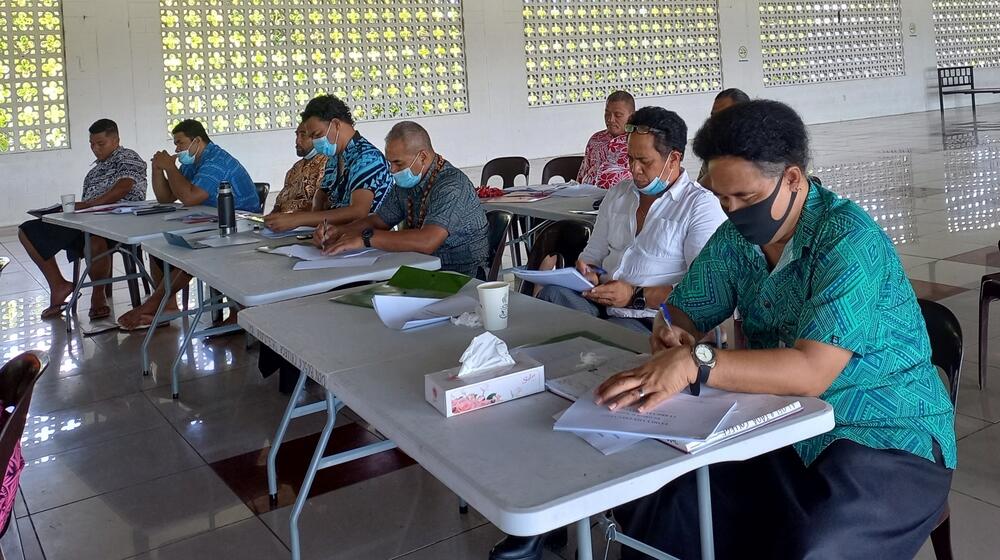Family Life Education (FLE) is a curriculum-based and human-rights approach to teaching gender norms, respectful relationships, bodily developments, and healthy living for the young people of Samoa. The goal is to reduce gender-based violence (GBV) through educating youths.
The United Nations Population Fund (UNFPA Pacific) implemented the FLE teacher orientation in Upolu and Savaii islands on the 6th and 10th June 2022 respectively, supported by the Spotlight Initiative programme funded by the European Union (EU). The FLE Teacher Orientation was conducted by the UNFPA FLE Coordinator, Gatoloai Tili Afamasaga, assisted by Ministry of Education, Sports and Culture Technical and Vocational Education and Training (MESC TVET) Principal Officer Seiuli Samasoni Moala with the aim to re-introduce the teaching of the FLE curriculum into both in-school and out-of-school youths of Samoa.
Twelve Upolu and 15 Savaii secondary school principals attended the FLE Orientation sessions and were presented with plans to upgrade the knowledge and skills of teachers on FLE. The senior educators attending the FLE Orientation reflected on national efforts led by MESC to re-introduce and strengthen the FLE curriculum in the school system. Especially in these times, youths face many challenges including teenage pregnancy, cyberbullying, gender-based violence, sexually transmitted infections (STIs), and substance abuse.
FLE is not a stand-alone subject in the school curriculum, but FLE concepts are taught in carrier subjects such as Health and Physical Education, Social Studies, Food and Textile, and Samoan language. And FLE concepts need strengthening in these subjects, as for instance HPE is taught for only a few hours each week, compulsory at primary, and optional at the secondary level.
While welcoming secondary school teachers gathered for their orientation on Family Life education, the Deputy CEO for the Ministry of Education, Sports, and Culture, Tuaopepe Perenise Tinei, said in his opening remarks: “O le tele o sulu, e maua ai figota,” a Samoan proverb, meaning that with more light (back in the day, dried coconut leaves were used as torches for light at night fishing), you will have a good seafood harvest Ms. Suni Matavai, School Principal of Aleipata College, was cautious of the use of culturally acceptable language to teach FLE concepts. Especially at Aleipata College, a rural district an hours’ drive from urban Apia. Each college in Samoa is run by a school committee comprising of villagers from the district who have influence over what is being taught to students. But in general, she agrees that in-school FLE needs strengthening, so young people are taught positive principles on respectful relationships.
Similarly, Letele Maiava, School Inspector for the Itu-o-Tane schools, on the northern shores of Savaii, was also cautious of the FLE language, both in English and Samoan subjects. FLE subjects and concepts are sensitive and taboo in rural communities. However, as a senior educator, Letele was adamant that FLE should be taught as a standalone subject, much like the other subjects such as English, Geography, etc. The respected matai pointed out the increasing trend of GBV as an area that teaching FLE can address.
FLE is a key intervention of the Australian Government-funded Transformative Agenda (TA) programme—a partnership between UNFPA Pacific and the governments of Fiji, Kiribati, Samoa, Solomon Islands, Tonga, and Vanuatu that aims to move the unmet need for family planning in the focus countries to zero. Quality FLE is considered essential for addressing issues related to sexual and reproductive health, including family planning, especially among adolescents and youth.
The strengthening of FLE in the education sector is driven by the FLE Multi-Stakeholder Committee headed by Gatoloai Tili Afamasaga and comprising three sub-committees – Curriculum Development, Teacher Training Development, and Out-of-School committee. A Situational Analysis Report in 2018 recommended the establishment of an FLE MSC to re-vitalize and plan the strengthening of FLE in the school curriculum. Achievement of the FLE MSC is the development and finalization of an FLE Curriculum Statement which applies across school grades from Year 1 to Year 12. The Curriculum Statement is now before MESC management for review and adoption.
In the pipeline for completion, this year is a micro-credential on FLE for in-service training of teachers. Implementation will include face-to-face teaching plus 10 weeks of practical teaching back at the respective schools. Also in the pipeline is a Minor on FLE for the Bachelor of Education undergraduate programme at the National University of Samoa, currently being prepared by the Teacher Training sub-committee. The Samoa Demographic Health Survey (DHS) Multi-Indicator Cluster Survey 2019 (MICS) found that 52.3 per cent of women (15-49) had experienced physical violence by their intimate partner in their lifetime; 18.7 per cent in the past 12 months.


